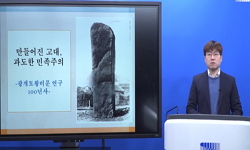Stateism(國家主義) is the assertion that the state power is superior to the right or freedom of an individual, and hence cannot go with liberalism. During the 20th centurv, stateism exerted stronger influence on the society of Korea than the liber...
http://chineseinput.net/에서 pinyin(병음)방식으로 중국어를 변환할 수 있습니다.
변환된 중국어를 복사하여 사용하시면 됩니다.
- 中文 을 입력하시려면 zhongwen을 입력하시고 space를누르시면됩니다.
- 北京 을 입력하시려면 beijing을 입력하시고 space를 누르시면 됩니다.
https://www.riss.kr/link?id=A76535822
- 저자
- 발행기관
- 학술지명
- 권호사항
-
발행연도
2002
-
작성언어
Korean
-
주제어
국가주의 ; 초국가주의 ; 민족주의 ; 일민주의 ; 민족청년단 ; 이광수 ; 최재서 ; 이범석 ; 안호상 ; 이승만 ; stateism ; ultra-nationalism ; nationalism ; llminism ; National Youth Association ; Yi Gwang-su ; Choe Jae-seo ; Yi Beom-seok ; Ahn Ho-sang ; Rhee Syngman
-
KDC
911.02
-
등재정보
KCI우수등재
-
자료형태
학술저널
- 발행기관 URL
-
수록면
199-246(48쪽)
- 제공처
-
0
상세조회 -
0
다운로드
부가정보
다국어 초록 (Multilingual Abstract)
Stateism in Korea was deeply rooted in the theory of organic state which was dominant during the years of Korean Empire, and also in the theory of organic nation(minjok) which was popular during the 1910s and 1920s. Stateism in Korea supported the idea that nation(minjok) was not just a population of individuals, but a unique entity with its own characteristics. During the 1930s, Fascism flourished in Europe and in Japan, and Korean society was under the influence of it. Japanese Ultra-nationalism in particular, forced people both in Korea and in Japan to make pledges to be loyal to the Japanese king and Japan. It provided a good foundation for the burgeoning of stateism in Korea. Some Intellectuals in Korea like Yi Gwang-su or Choe Jae-seo, to name a few, were well assimilated into the idea of Fascism and ultra-nationalism because they already developed a strong preference for collectivism and nationalism.
Yi Beom-seok, who participated in the independence movement in China, was also influenced by ultra-nationalism of Chinese Youth Party. Ahn Ho-sang, who was a student abroad in Germany, was influenced by Fascism as well. In 1946, they organized National Youth Association under the slogan of ultra-nationalism. Some other nationalists, historians and politicians participated in this organization. They argued that the nation had to be given a supreme power.
Rhee Syngman, the first President of R.O.K., suggested that Ilminism(一民主義) could be an ideal alternative for Korea. Ilminism gives priority to state and nation(minjok). Ahn Ho-sang, the first minister of education, supported the ideology of Ilminism. Rhee Syngman and Ahn Ho-sang criticized not only communism but also capitalism. However they advocated capitalistic ownership, just as Fascist did in 1930s. After the Korean War, Ilminism seemed to disappear as the anti-communism gained more power as a leading ideology in Korea. But in fact, the influence of stateism in Korea was maintained until 1980s.
Stateism(國家主義) is the assertion that the state power is superior to the right or freedom of an individual, and hence cannot go with liberalism. During the 20th centurv, stateism exerted stronger influence on the society of Korea than the liberalism. In this paper, it was examined how the stateism has been developed in Korea during the early 20th century.
Stateism in Korea was deeply rooted in the theory of organic state which was dominant during the years of Korean Empire, and also in the theory of organic nation(minjok) which was popular during the 1910s and 1920s. Stateism in Korea supported the idea that nation(minjok) was not just a population of individuals, but a unique entity with its own characteristics. During the 1930s, Fascism flourished in Europe and in Japan, and Korean society was under the influence of it. Japanese Ultra-nationalism in particular, forced people both in Korea and in Japan to make pledges to be loyal to the Japanese king and Japan. It provided a good foundation for the burgeoning of stateism in Korea. Some Intellectuals in Korea like Yi Gwang-su or Choe Jae-seo, to name a few, were well assimilated into the idea of Fascism and ultra-nationalism because they already developed a strong preference for collectivism and nationalism.
Yi Beom-seok, who participated in the independence movement in China, was also influenced by ultra-nationalism of Chinese Youth Party. Ahn Ho-sang, who was a student abroad in Germany, was influenced by Fascism as well. In 1946, they organized National Youth Association under the slogan of ultra-nationalism. Some other nationalists, historians and politicians participated in this organization. They argued that the nation had to be given a supreme power.
Rhee Syngman, the first President of R.O.K., suggested that Ilminism(一民主義) could be an ideal alternative for Korea. Ilminism gives priority to state and nation(minjok). Ahn Ho-sang, the first minister of education, supported the ideology of Ilminism. Rhee Syngman and Ahn Ho-sang criticized not only communism but also capitalism. However they advocated capitalistic ownership, just as Fascist did in 1930s. After the Korean War, Ilminism seemed to disappear as the anti-communism gained more power as a leading ideology in Korea. But in fact, the influence of stateism in Korea was maintained until 1980s.
목차 (Table of Contents)
- Ⅰ. 머리말
- Ⅱ. 한말~1920년대의 국가관과 민족관
- Ⅲ. 1930년대 전반 이광수 ? 신흥우의 파시즘 수용
- Ⅳ. 중일전쟁 이후 일본 파시즘과 초국가주의 수용
- Ⅴ. 해방 직후 민족청년단의 민족지상ㆍ국가지상주의
- Ⅰ. 머리말
- Ⅱ. 한말~1920년대의 국가관과 민족관
- Ⅲ. 1930년대 전반 이광수 ? 신흥우의 파시즘 수용
- Ⅳ. 중일전쟁 이후 일본 파시즘과 초국가주의 수용
- Ⅴ. 해방 직후 민족청년단의 민족지상ㆍ국가지상주의
- Ⅵ. 정부수립 후 이승만ㆍ안호상의 一民主義
- Ⅶ. 맺음말
- 〈ABSTRACT〉
동일학술지(권/호) 다른 논문
-
1749년(영조 25) 蔚山邑誌 《鶴城誌》의 편찬과 그 의미
- 한국사연구회
- 禹仁秀(Woo In-Soo)
- 2002
- KCI우수등재
-
- 한국사연구회
- 金昌賢(Kim Chang-Hyun)
- 2002
- KCI우수등재
-
金泰植 著, 《미완의 문명 7백년 가야사》(푸른역사, 서울) 2002, 1권 320쪽ㆍ2권 280쪽ㆍ3권 316쪽
- 한국사연구회
- 李永植(서평자)
- 2002
- KCI우수등재
-
- 한국사연구회
- 金甲童(Kim Gap-Dong)
- 2002
- KCI우수등재





 DBpia
DBpia






